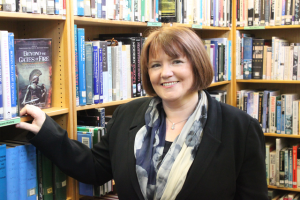
Angela Drew is head at Bromley High School, an institution which prides itself on its progressive attitude to female leadership and educating girls about the defining issues in modern society. As well as receiving high praise from inspectors for her clear vision for the school, she is also highly committed to developing her staff – something that parents have often commented on. Here Angela explains these aspects of leadership and the continued importance of providing a well-balanced education for all her girls

‘Our vision is of generations of women, now and in the future, who have the ability to lead, to make a difference to the world.’ So reads the final line of the aims and ethos of Bromley High School – long thought of as an ideal setting for highly capable and ambitious girls.
An exceptional case
Since September 2014 Angela Drew has led the school admirably, pursuing this vision and carrying on the fine traditions of the Girls’ Day School Trust (GDST), of which the school is a member. Credited with developing gifted teachers, and adding further to the school’s glowing academic reputation, she also guided the school to the achievement of an ISI inspection rating of ‘exceptional’ during the spring of last year.
In part, encouraging staff to reach their full potential has been dependent not only on a focus on excellence within the classroom but on a commitment to teachers’ wellbeing outside of it. “We have a formal staff consultative committee where teachers and support staff can suggest improvements in our practice and a wellbeing committee which considers events and initiatives for staff,” Angela says. “So, for example, staff have use of the school fitness suite on a daily basis, use of the swimming pool, quiz nights with pizza and fish and chips – that’s with all teaching and support staff from both the junior and senior schools.”
If you want girls to benefit from inspirational teaching, then you need to nurture teachers’ enthusiasm
Angela feels that recruiting the best staff, whilst important, is not the only factor determining Bromley’s academic success. “If you want girls to benefit from inspirational teaching, then you need to nurture teachers’ enthusiasm by giving them the freedom to try out new ideas and take risks,” she says. “The task of showing how staff can keep joy in the job is just as important as making decisions about who steps through our doors and starts working with us.”
The other major element involved in staff development is networking with the GDST and speaking with teachers to provide them with the confidence needed to put themselves forward for new and exciting positions. Most recently, this process has worked to fine effect in steering Bromley’s previous director of studies to become deputy head of the Bromley High Junior School – an appointment made earlier in the year by Angela. “Our new deputy head of juniors followed a Trust-led ‘Aspiring Leaders’ programme which brings the most ambitious and dynamic staff from across the Trust’s schools to train together to become future leaders,” Angela explains. The aspiring leaders programme is a one-year course that involves a series of workshops alongside high quality mentoring and coaching sessions.
Managing inspection
Angela’s approach to the inspection process – Bromley was one of the last schools to be inspected under the previous inspection format which used the ‘exceptional’ descriptor to represent the best possible outcome and which has now been replaced with ‘excellent’ – just like her approach to leadership elsewhere, sets teachers at ease whilst making sure alternative solutions can be sourced quickly should any obvious challenges present themselves.
The biggest issue in inspections over recent years has been gaps and inconsistencies on the SCR
Take, for example the subject of safeguarding and her clear-sighted view of how to deal with the Single Central Register (SCR) of appointments and its comprehensive guidelines. “The biggest issue in inspections over recent years has been gaps and inconsistencies on the SCR,” Angela says. “Headteachers have to assure themselves that the SCR is flawless but there’s no point in this becoming a source of anxiety for a head; there are plenty of experienced freelance advisors who will audit the SCR and check policies for regulatory compliance for a reasonable fee.”
- It’s important that all teachers have a thorough knowledge of the criteria for an ‘excellent’ grading and a thorough understanding that they can best help the inspection process if they can relate the opportunities and experiences which the school provides for its pupils to the impact of that provision on pupils’ learning, achievement and personal development.
- Ultimately, the most successful inspections are those where the governors, senior leadership, teachers, support staff, pupils and parents have a shared sense of the spirit of the school, what is most important in its ethos and what it does best.
‘Exploring strengths and weaknesses’
Being positive about the inspection process and thinking of it, not as an undertaking to appease the ISI, but an opportunity to draw healthy conclusions about the school’s performance, has also proved to be a hugely successful strategy – something that other schools can learn from. “If you believe in your school it shouldn’t be an intimidating process,” Angela says. “The process works so much better if you can imagine that you are in a partnership with inspectors in exploring the strengths and weaknesses of the school.”
The implementation of a clear vision for the school has been shaped by a determination to offer a holistic education to pupils and making sure that a balance is struck between both meeting academic targets and wellbeing. “There are so many pressures in our social media aware world, including commercial interests that make girls unhappy and dissatisfied with the way they look,” Angela says. “We actively push against this as soon as girls begin Reception by making them resilient and confident. There’s no point in excellent leadership or excellent management or excellent health and safety if this doesn’t enable girls to take risks and think differently.”
I think it’s tremendously important to have girls understand the nature of their emotional processes
One such example of how girls are being made to feel more resilient and confident is a pilot programme supported by the GDST called, ‘The positive project’ – an initiative organised by Dr Brian Marien, a leading health psychologist. The main principles underpinning the project include educating girls about neurological science, helping them explore mindfulness and encouraging them to adopt a positive mindset. “I think it’s tremendously important to have girls understand the nature of their emotional processes,” Angela says.
With her leadership responsible for maintaining Bromley’s strong identity as an all-girls powerhouse, and committed to showing both pupils and teachers that they can achieve anything they set their minds to, Angela’s impact on the school will be one that endures long beyond the time she decides to give up her day job!
